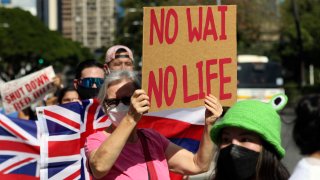
The Navy on Thursday issued written reprimands to three now-retired military officers for their roles in the spill of jet fuel into Pearl Harbor’s drinking water in 2021 but did not fire, suspend, dock the pay or reduce the rank of anyone for the incident.
The spill from the Red Hill Bulk Fuel Storage Facility poisoned thousands of military families and continues to threaten the purity of Honolulu’s water supply.
Navy Secretary Carlos Del Toro issued censure letters to the three rear admirals, the Navy said in a news release. He also revoked personal military decorations awarded to five rear admirals, three captains and one commander.
“Taking accountability is a step in restoring trust in our relationship with the community,” Del Toro said in a statement.
The spill “was not acceptable,” and the Navy will continue "to take every action to identify and remedy this issue," he said.
A Navy investigation last year concluded a series of errors caused the fuel to leak into a well that supplied water to housing and offices in and around Joint Base Pearl Harbor-Hickam. About 6,000 people suffered nausea, headaches, rashes and other symptoms.
The investigation concluded operator error caused a pipe to rupture when fuel was being transferred between tanks on May 6, 2021, leading 21,000 gallons (80,000 liters) to spill. Most of this liquid flowed into a fire suppression line and sat there for six months, causing the line to sag. A cart then rammed into the drooping line on Nov. 20, releasing 20,000 gallons (75,700 liters) of fuel that entered a French drain and the drinking water well.
U.S. & World
The spill came even though the Navy for years reassured Oahu residents their water was safe despite Red Hill's history of leaks, including when 27,000 gallons (102,206 liters) seeped from one tank.
The water poisoning upset people across Hawaii, including veterans, environmentalists, Native Hawaiians, liberals and conservatives.
Get a weekly recap of the latest San Francisco Bay Area housing news. >Sign up for NBC Bay Area’s Housing Deconstructed newsletter.
Wayne Tanaka, director of the Sierra Club of Hawaii, called the reprimands “outrageous” considering the damage done and the ongoing threat the leak poses to an aquifer underneath the tanks.
“Just to have these written slaps on the wrist is insulting to our people, to our dignity,” Tanaka said.
After months of resistance, the military agreed to an order from the state of Hawaii to drain the World War II-era tanks. It has spent the past year repairing equipment at the facility to safely remove the fuel beginning next month. It expects to finish by Jan. 19.
Three officers received letters of censure from Del Toro: Retired Rear Adm. Peter Stamatopoulos, who was the commander of Naval Supply Systems Command during the May and November spills; Rear Adm. (retired) John Korka, who was commander of the Navy Facilities Engineering Command Pacific before the two spills; and Rear Adm. (retired) Timothy Kott, who was the commander of Navy Region Hawaii during the November spill.
U.S. Sen. Mazie Hirono, a Democrat from Hawaii, said in a statement that true accountability for the disaster would require the Navy to address “systemic command and control failures, and a lack of requisite attention to infrastructure.”
She noted the Navy's investigation found that a culture of complacency, a lack of critical thinking, and a lack of timely communication contributed to the spill.
"I have yet to see adequate evidence that Navy leadership is treating these service-wide issues with the seriousness or urgency they demand,” Hirono said in a statement.
Hirono, who is a member of the Senate Armed Services Committee, said she would continue pushing the Navy to make these systemic changes.



